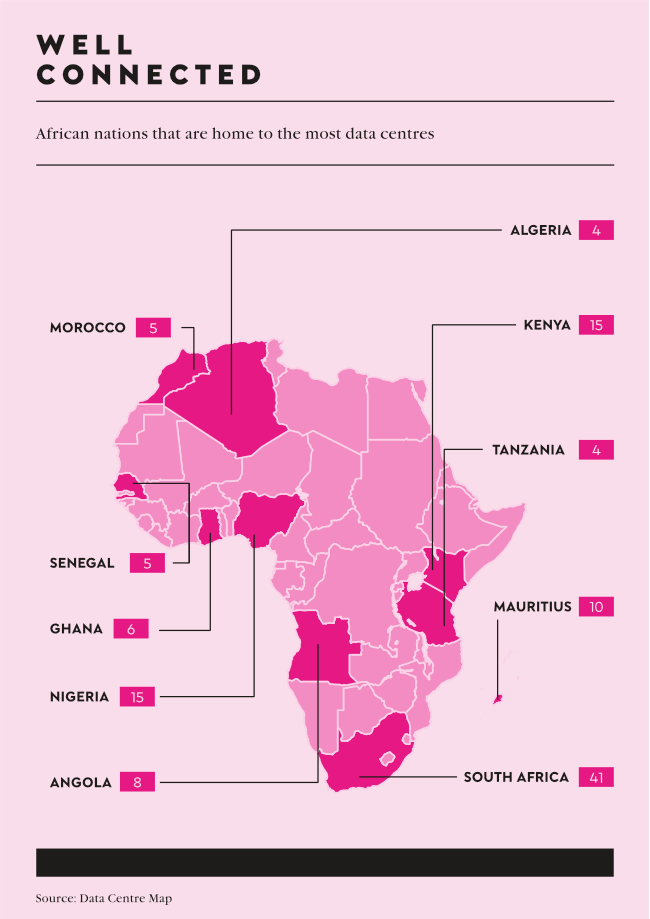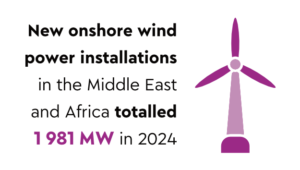‘The continent will need more than 700 data centres in the long run to fully benefit from the growing segment and ensure its digital sovereignty.’ Those are words from Ayotunde Coker, chairman of the Africa Data Centres Association (ADCA), in the foreword to the ADCA’s latest report on the state of the data centre industry on the continent.
‘We believe that the industry is set for rapid development in line with the growth of the digital economy across the continent. The development of data centres is picking up pace due to strong demand from economic operators, as well as increasing awareness that African countries must establish their digital sovereignty in an increasingly competitive and complex world,’ he writes.
In recent years Africa has experienced significant economic growth – yet the continent still lags behind in certain critical infrastructure, especially in digital technologies. One of the most vital aspects of this technological infrastructure is data centres, which are the backbone of the modern digital economy. They enable everything from online banking and e-commerce to social media, healthcare and cloud-based services. Data centres play a critical role in fostering innovation by providing businesses and entrepreneurs with access to cloud-based services, computational resources and storage capabilities.
African nations with robust data centre infrastructure will be better positioned to compete in industries such as finance, e-commerce and IT. This increased competitiveness will contribute to overall economic growth and position Africa as a key player in the digital economy.
‘Today, there are 307 MW of live data-centre capacity across the continent, or less than 2% of the global total, with most of this capacity concentrated in South Africa, Kenya and Nigeria,’ according to the ADCA. ‘A dozen more African countries have economies sufficient to support the data-centre and cloud-services ecosystem, and estimates indicate at least 1 200 MW of new capacity is required by 2030 to meet the continent’s demand for digital services.’
It says revenue from the African data centre market is expected to ‘expand at a compound annual growth rate of 12% in 2019–2025 to US$3 billion. Demand for cloud-based services and modular DC [data centre] solutions from organisations – particularly small and medium-sized enterprises – and government agencies, will underpin the market, with more than 70% of African organisations expected to shift to the cloud by 2025’.
Due to the lack of local facilities, many African countries rely on data centres located in Europe, the US or Asia to manage their data. This reliance on overseas facilities results in high latency and slower internet speeds, which can affect everything from browsing the web to running business applications. High latency not only diminishes user experience but also stifles the growth of digital services that require real-time data processing, such as online gaming, video conferencing and live streaming.
Establishing more data centres locally in Africa can drastically reduce latency. By bringing computing power closer to users, data centres enable faster access to digital services, which, in turn, enhances internet access and connectivity.
Improved connectivity is crucial for a continent with a rapidly growing young population eager to participate in the digital economy. Furthermore, low-latency connections are essential for businesses seeking to adopt modern digital tools, which can streamline operations and improve efficiency.
With local facilities, African start-ups and small businesses can benefit from lower costs for these essential services, allowing them to scale more effectively. Additionally, data centres enable companies to access advanced technologies such as AI, machine learning and big data analytics.
‘Over the past three years, the market has accelerated with increasing investments across Africa,’ says analyst Mark Acton in a research paper for Future Tech. ‘These investments go beyond the initial foothold in South Africa, which currently accounts for the majority of data centre space on the continent.
‘There is growing confidence in the market potential, especially with new subsea cables along the African coast driving data centre growth and increasing recognition of the importance of data sovereignty.’
The need is there – and companies are reacting to that. In June, for instance, it was disclosed that Africa Data Centres, which operates a network of facilities across the sub-Saharan region, had secured a ZAR2 billion financing capacity that will allow it to accelerate expanding its data centre capacity by an additional 20 MW.
‘This funding is a significant milestone in the growth of Africa Data Centres,’ said Hardy Pemhiwa, president and group CEO of Cassava Technologies, the parent company of Africa Data Centres. ‘It underscores our commitment to growth and our confidence in the future of the South African data centre market. The additional funding will allow us to support the digital transformation journeys of our customers. Data centres are key to delivering on our vision of a digitally connected future that leaves no African behind.’
The next month, the company announced it would be expanding its CPT1 facility in Cape Town. It said the expansion would add ‘three new halls in new areas on the campus and adds another 6 MW of IT load, effectively doubling its current capacity’.
‘In terms of size, the expansion adds 1 000 racks of white space or the space available for customers to lease, although the physical site is significantly larger than that. It is made up of two more colocation data halls and one hyperscale hall. Additionally, this data centre boasts hybrid cooling technology capable of handling both air cooling and liquid cooling.’ The company claims it will be ‘one of the most efficient and sustainable data centres ever built in South Africa’ and will be powered by renewable energy.

Finhai Munzara, interim CEO of Africa Data Centres, says that ‘Cape Town is an excellent location for colocation facilities as it is a stone’s throw away from all the submarine cable landing stations. In addition, the Cape Town facility houses the Cape Town Internet Exchange, which makes multi-region peering more accessible, efficient and easy to manage. This also facilitates direct connections between networks, enabling data to flow more efficiently and reducing latency, giving our users a faster, more responsive online experience.’
This is just one of the many examples of data-centre development in South Africa, the continent’s most sophisticated economy. Locally, the market is dominated by Teraco, which has multiple facilities in the country’s three major cities. The company says more that ‘650 organisations including enterprises, Tier-1 carriers, fintech, global and local cloud, content, integrators, ISPs, security and storage, are colocated within Teraco’.
Yet other markets away from South Africa are also seeing rapid data centre growth to keep up with digital demand. In August, for example, the DRC’s first carrier-neutral, open-access data centre began operations in Kinshasa. Developed by OADC in partnership with local real estate firm TEXAF, the 2 MW, 1 500 m2 facility has a capacity of 550 racks.
‘OADC Texaf Digital Kinshasa is central to boosting many sectors of the DRC’s economy, creating rich and vibrant digital ecosystems, and providing content distribution networks and cloud content providers with access to a quality peering location in the country,’ said Mohammed Bouhelal, MD of OADC Texaf DRC.
The continent’s future as a competitive player in the global digital economy depends on its ability to build and maintain robust digital infrastructure, with data centres playing a foundational role in this journey. The expansion of data centres in Africa is therefore a crucial and vital step towards fully realising the continent’s economic potential.
Images: Freepik, Gallo/Getty Images


















